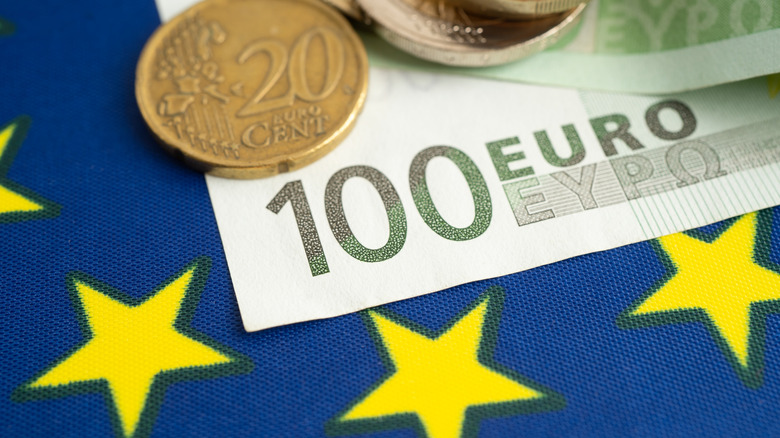Two Of Europe's Largest Economies Are Shrinking. Here's Why It Matters
In today's global economy, it can be more important than ever to keep track of the health of other major countries. Not only can the economies of other countries help us monitor larger scale economic trends, but they can also help us predict any potential future problems. Just as the U.S. economy can impact Europe, it's success or decline can significantly affect consumers. Case in point, the economic decline of two of Europe's largest economies: Germany and France.
As Neil Shearing, chief economist at Capital Economics, said in a December 2024 report, "Europe faces ongoing decline without fundamental [fiscal] reform at its core." Without significant changes, he argued, "it is difficult to escape the conclusion that Europe's future is one of very low growth, continuing concerns about fiscal sustainability and a dwindling sense of standing in a world increasingly characterized by a superpower rivalry between the U.S. and China." With the second term of Trump, and his less-than-popular foreign policy proposals (such as his insistence on widespread tariffs), Europe could be headed for even slower growth and stagnation in the coming years. This decline could ultimately negatively impact the U.S. in a number of ways. For starters, it could lead to fewer trade opportunities which could impact the available imports for U.S. consumers. Another concern is how Europe's weaker economy could ultimately weaken U.S. alliances globally. As Europe's influence on international topics decreases, the U.S. stands to not only lose an important ally but also face the very real possibility of power vacuums in problematic geographic regions.
Germany's economic situation
Germany has the largest economy in all of Europe. This is largely due to the country's extensive manufacturing (specifically automotive) and generally higher exports. However, in recent years the country has struggled. Carsten Brzeski, head of macroeconomics at ING, explained to CNN that this last year was the first time Germany's economy had shrunk two years in a row since the early 2000s. According to Germany's Federal Statistical Office, the country's gross domestic product (GDP) fell 0.2% in 2024 on top of falling 0.3% in 2023.
Some of the biggest factors negatively impacting Germany's economy are increased labor costs. More data from the Germany's Federal Statistical Office found that the country has some of the highest labor costs out of all European Union countries. Other issues plaguing the country's economy are tied to weak growth and increased competition from China. This is especially true when it comes to automotive manufacturing, a core element of Germany's manufacturing industry. Both China and Tesla have outmatched the manufacturing capabilities of German heavyweights like Volkswagen (which also owns Audi and Porsche), with Germany's electric vehicle capabilities, in particular, falling short. All of this combines to slow down Germany's economy, which affects the trade relationship that the country has with the U.S. in addition to the potential to negatively impact jobs. To be more specific, German companies are actually the third-largest foreign employer in the U.S. so a shrinking economy and lack of company growth could lead to higher unemployment.
The economic situation in France
France faces different economic concerns than Germany, despite similar political upheaval. Currently, France is set to hit a budget deficit of 6.1%, with national debt reaching 112%, according to official government statistics. However, France has been unable to truly address its economic concerns due to the collapse of the country's government in late 2024. A December no-confidence vote on the country's Prime Minister not only left France without a functioning government but also without a budget. As the Confederation of Small and Medium Enterprises explained to The New York Times at the time, "A France without a budget would open the door to a debt crisis, the consequences of which would hit economic players hard."
France faces a multitude of economic issues ranging from high interest rates to slowing growth to a general downturn in the country's domestic industry. This, combined with a deeply divided legislature (and subsequent political turmoil) has turned many businesses and investors off to the idea of further investing in the country. This lack of investment further contributes to a lack of hiring and a lack of growth. In what should be a surprise to no one, much of France's economic concerns are rooted in pandemic spending. With that said, France's borrowing costs are now well above those of Greece (which, rather infamously, had to be bailed out from economic collapse following the 2007-2008 financial crisis) which has led to falling consumer confidence in the country's government. Like Germany, this could spell trouble for the E.U. and negatively impacting Europe's relationship with the U.S.


